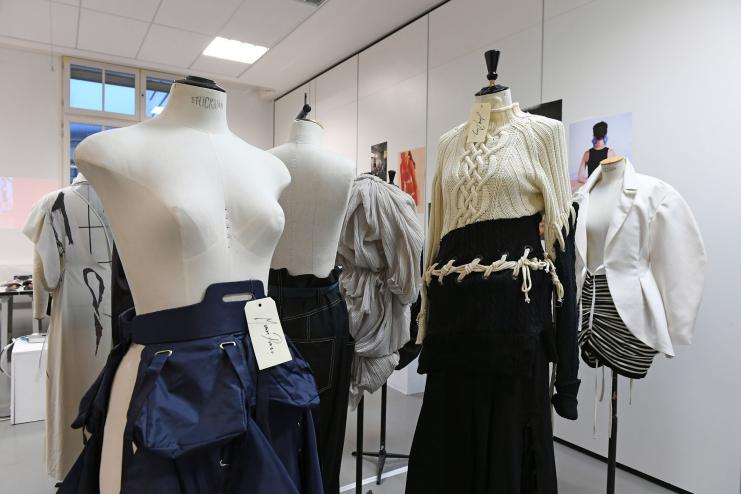Fashion and Accessory Design

The Fashion and Accessory Design department offers students numerous viewpoints on fashion and accessories. They focus on craftsmanship, technique and on artistic, theoretical and experimental conceptualization, in relation to current social and environmental issues.
The curriculum casts a critical eye on a devastating industry for both the environment and humans. It supports the students’ commitments and innovative answers in each plastic project.
- It provides them the tools they need to evolve in the world of fashion, clothing and accessories. The latter ceaselessly changes and thus shapes new ecological, human, scientific, theoretical and plastic variables.
- Understanding an industry, studying its history, analyzing its issues to have a relevant and singular approach.
- Learning to conceptualize, structure, model and create, using the appropriate skills and techniques and the materials and methods of constructions which fit the purpose the best.
- Ecological and sustainable thinking which serves humans and both their current and future environment, with a zero waste approach.
- Knowing and using both past and present manufacturing methods, considering a situation where the project economy is vital.
- Prototyping and pattern-making course – in workshops.
- Conceptualizing and making accessories course.
- Clothing design course.
- History of fashion and costume course.
- Workshops and partnerships with companies on specific themes.
- Multidisciplinary workshops with students from other departments to favor working collaboratively and sharing skills.
Teaching
The Fashion and Accessory Design curriculum is based on a gradual approach which enables students to gain experience and develop both practical and theoretical skills.

Bachelor’s Degree
All students follow the same multidisciplinary curriculum in Year 1, at the end of which they choose the department they wish to enter for the Bachelor’s degree. The degree lasts two years. Outside students may apply to transfer into the department in Year 2.
Years 2 and 3 are dedicated to learning the basics of clothing and accessory design.
Those two years provide students both the time and the means to develop a creative approach. They benefit from technical courses (draping, patternmaking) and theoretical and cultural courses (regular lectures, conferences, debates around social and environmental issues).
The curriculum provides plastic and formal tools, iconographic references (history of fashion and costume courses, workshops and partnerships) and practical skills (knitting, prototyping, pattern-making and assembly workshops…). The entire creative process respects the economy of means and the new environmental rules. It also encourages collaborative work to solve the new issues raised by fashion nowadays.
The textile and formal experiments, the technical skills, the craftsmanship and the knowledge gained thanks to the courses and workshops widen the future creative exploration possibilities.
2ème cycle, Master
Knowing the technical basics is fundamental to carry out a conceptual project.
The materials & textiles and knitting courses enable students to understand the basics of fabrics and to develop the sensibility that is essential to ensure the coherence of materials and volume in any clothing design.
Iconographic and experimental research is also conducted at the same time to tackle any issue creatively.
Elaborating a mood board made of images stemming from iconographic research or personal models enables students to develop their creative signature and to shape their objectives.
*These exercises, practiced during classes and workshops, develop the methodological skills required to revolve issues and carry out projects. Students are all the more prepared to face the expectations of the professional world.
Enseignant·es
| Nom | Fonction | |
|---|---|---|
Anne Ferrer
Anne Ferrer
Expositions (selection): Formation: |
Concepteur volume textile | |
Guénolée Milleret
Guénolée Milleret
Ancienne responsable des archives documentaires de la maison Yves Saint Laurent et collectionneuse privée, Guénolée Milleret est la fondatrice et l’administratrice de l’iconothèque https://www.imagesguenomiller.com/ un fonds patrimonial entièrement numérisé et référencé, riche de plus de 17500 documents (gravures et lithographies de mode, mobilier, vues d’intérieur et d’architecture du XVIIe siècle jusqu’aux années 1950). En parallèle – depuis 2011 – Guénolée Milleret enseigne l’histoire de la mode et du costume à l’École nationale supérieure des Arts Décoratifs (Paris) et à ESMOD (Rennes). À travers ses premières publications, elle contribue notamment à la redécouverte du patrimoine iconographique constitué au fil des siècles par l’édition d’art documentaire et la presse spécialisée (mode, décor intérieur et architecture). Auteure-éditrice indépendante sous la marque éditoriale © éditions du canezou, Guénolée Milleret publie une collection d’ouvrages sur les métiers de la mode. L’ambition de ces publications est de mettre en lumière les artisans eux-mêmes en prenant appui sur un point de vue historique étayé, avant de rejoindre le présent et d'apprécier l’engagement des acteurs contemporains dans leurs différentes configurations de travail. • L’Atelier du bottier - Collection Talents & Savoir-faire, éditions du Canezou, 2025 |
Auteure | |
Gilles Rosier
Gilles Rosier
Gilles Rosier est enseignant et coordonnateur du secteur Design Vêtement à l'École. |
Directeur artistique |
Diplômes
Mémoires
| Étudiant.e.s | Titre du Projet | Année |
|---|
